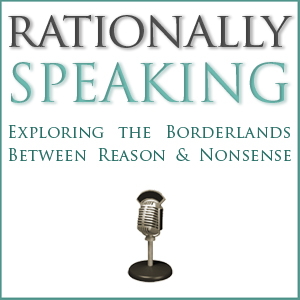Understanding moral disagreements (Jonathan Haidt)
Rationally Speaking Podcast
New York City Skeptics
4.6 • 787 Ratings
🗓️ 18 February 2021
⏱️ 66 minutes
🧾️ Download transcript
Summary
Julia and social psychologist Jonathan Haidt (The Righteous Mind) discuss his moral foundations theory and argue about whether liberals should “expand their moral horizons” by learning to think like conservatives. Julia solicits Jon’s help in understanding her disagreement with philosopher Michael Sandel, in episode 247, over the morality of consensual cannibalism.
Transcript
Click on a timestamp to play from that location
| 0:00.0 | This episode of Rationally Speaking is brought to you by Givewell, the nonprofit that searches for evidence-based charities where your donation can do the most good. |
| 0:10.7 | In 2020, podcast listeners like you gave over $1.6 million to Givewell recommended charities, preventing tens of thousands of cases of disease and hundreds of deaths. |
| 0:21.1 | In 2021, Givewell is encouraging you to keep the giving spirit alive. |
| 0:24.9 | Any listener who starts a new monthly donation by the end of February |
| 0:28.2 | will have their first month matched up to $250. |
| 0:32.3 | Just go to givewell.org slash rationally speaking, |
| 0:36.2 | choose to give monthly, and then when you're checking out, pick |
| 0:39.5 | podcast and rationally speaking at checkout. I really have a lot of respect for Givewell's commitment |
| 0:45.3 | to rigor and transparency in figuring out how to do the most good possible. Please |
| 0:50.8 | check them out at givewell.org slash rationally speaking. |
| 1:16.6 | Welcome to Rationally Speaking, the podcast where we explore the borderlands between reason and nonsense. I'm your host Julia Galef, and my guest for this episode is Jonathan Haidt. He is a social |
| 1:24.1 | psychologist at New York University, and the author of several bestselling books, including The Righteous Mind, Why Good People Are Divided by Politics and Religion. |
| 1:34.3 | That's the book in which John talks about his work on moral foundations theory, which you may have heard of, even if you haven't read the book. |
| 1:42.0 | It argues that all of our moral judgments are grounded in a short list of moral foundations, such as fairness and loyalty, and that liberals and conservatives tend to differ in which moral foundations they use. |
| 1:56.8 | That's the focus of our conversation in this episode. We talk especially about why and how people should try to understand the moral foundations of people who are across the political aisle from them. |
| 2:09.6 | This is something I've wanted to talk to John about for a while, but the immediate reason I got in touch with him was a recent episode I did with Harvard |
| 2:18.5 | philosopher Michael Sandell, in which Sandell and I tried and didn't quite succeed at understanding |
| 2:26.2 | our moral disagreements with each other. |
| 2:29.3 | And a number of listeners commented after that episode, hey, that sounded like a moral |
| 2:33.7 | foundation's disagreement. |
| 2:35.3 | You should really get John Hyde on the show to talk about that. And I thought that was a great |
| 2:39.2 | idea. So here is Professor Jonathan Height. He is talking about how he developed moral foundations |
... |
Please login to see the full transcript.
Disclaimer: The podcast and artwork embedded on this page are from New York City Skeptics, and are the property of its owner and not affiliated with or endorsed by Tapesearch.
Generated transcripts are the property of New York City Skeptics and are distributed freely under the Fair Use doctrine. Transcripts generated by Tapesearch are not guaranteed to be accurate.
Copyright © Tapesearch 2025.

